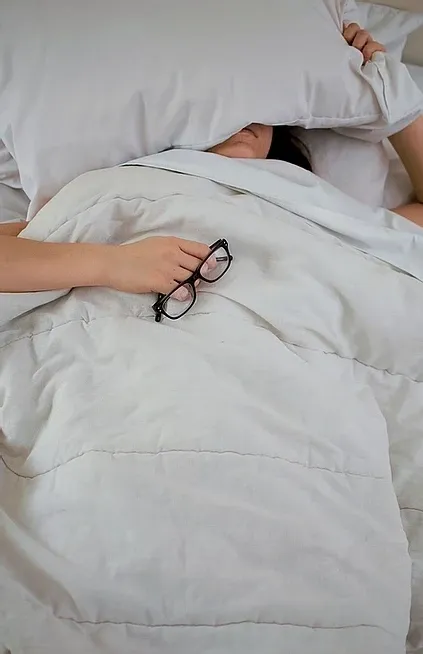
The Essential Role of Sleep and How Technology Disrupts It
Sleep is not just a time for our bodies to rest—it’s a critical component of our overall well-being, impacting everything from metabolism and memory storage to emotional regulation. Just ask any parent with a newborn who’s struggling through sleepless nights. The effects of inadequate sleep can be profound, influencing our mood, cognitive abilities, and even our physical health.
Imagine trying to navigate your day feeling as if you’re wading through a fog. That’s often how those who don’t get enough sleep experience life. When we sleep well, we feel more vibrant, emotionally stable, and capable of handling the daily stressors that come our way. But in today’s tech-driven world, many of us find ourselves struggling with sleep problems, often without realizing that our technology use might be a contributing factor.
The Sleep -Technology Connection
If you’re among the 95% of people who use their cellphones within an hour before bed, you might be setting yourself up for a restless night. Our screens emit blue light—a type of light that interferes with our body’s natural sleep-wake cycle. The blue light from our phones, tablets, and computers can disrupt the production of melatonin, a hormone that signals our body it’s time to wind down and prepare for sleep.
Think of your circadian rhythm as your body’s internal clock. This clock is synchronized with the natural light and dark cycles of the day. When evening approaches and it gets darker, our circadian rhythm signals the release of melatonin to prepare us for sleep. But when we expose ourselves to blue light from screens late at night, this signal gets overridden. Instead of signaling our body to relax, the blue light stimulates our brain, making it harder to fall asleep.
The impact of blue light on our sleep isn’t just theoretical—it’s supported by numerous studies. For instance, research has shown that people who use electronic devices before bedtime take longer to fall asleep and experience poorer sleep quality. The disruption of melatonin production leads to a delay in our sleep onset, causing us to toss and turn as we try to catch those elusive Zs.
The Cycle of Disruption
The problem doesn’t end once we manage to fall asleep. Studies have also found that around 33% of people who wake up in the middle of the night will check their phones. This behavior can further exacerbate sleep disturbances. When we wake up and reach for our phones, we’re often exposed to more blue light and engaging content that can stimulate our brains, making it even harder to return to a restful state.
I recall a period when I was struggling with sleep, often waking up in the middle of the night and instinctively grabbing my phone. I’d check emails, social media, or even watch a few minutes of a video, thinking it would help me relax. However, I soon realized that this habit was only making things worse. The bright screen and engaging content were keeping my brain active, and I’d end up lying awake for hours, trying to get back to sleep.
Practical Strategies for Better Sleep
If you find yourself in a similar situation, there are several strategies you can implement to improve your sleep and minimize the impact of technology on your rest:
- Establish a Screen-Free Bedtime Routine: One of the simplest and most effective changes you can make is to establish a routine that doesn’t involve screens. Try to put down your phone, tablet, or computer at least an hour before bed. Use this time to engage in relaxing activities that signal to your body it’s time to wind down. Reading a book, taking a warm bath, or practicing gentle yoga can help ease your body and mind into a restful state.
Utilize “Bedtime” Mode: If you can’t resist using your phone before bed, consider using the “bedtime” mode or “night shift” feature available on many devices. This mode reduces the amount of blue light emitted by your screen, making it less likely to interfere with your melatonin production. The screen will shift to warmer tones, which can be easier on your eyes and less likely to disrupt your sleep cycle.
Create a Relaxing Sleep Environment: Make your bedroom a sanctuary for sleep. Keep it cool, dark, and quiet. Invest in blackout curtains, a comfortable mattress, and consider using a white noise machine if external noises are a problem. Creating a sleep-friendly environment can enhance the quality of your rest and make it easier for your body to transition into sleep.- Resist the Urge to Check Your Phone: If you wake up in the middle of the night, try to resist the urge to check your phone. The temptation to scroll through notifications or messages can be strong, but it’s important to stay mindful of how this behavior affects your ability to fall back asleep. Instead, practice deep breathing or mindfulness techniques to help calm your mind and encourage a return to sleep.
Set a Consistent Sleep Schedule: Consistency is key to maintaining a healthy sleep cycle. Try to go to bed and wake up at the same time every day, even on weekends. This helps regulate your circadian rhythm and reinforces your body’s natural sleep-wake cycle. Over time, a consistent schedule can improve the overall quality of your sleep.
The Benefits of Prioritizing Sleep
Investing in your sleep is not just about avoiding grogginess—it has far-reaching benefits for your overall health and well-being. Quality sleep supports cognitive functions such as memory consolidation, problem-solving, and creativity. It also plays a crucial role in emotional regulation, helping you manage stress and maintain a positive outlook.
Additionally, getting sufficient sleep supports physical health by regulating metabolism and enhancing immune function. When you’re well-rested, you’re better equipped to handle daily challenges, make thoughtful decisions, and maintain healthy relationships. Prioritizing sleep can lead to improved productivity, better mood, and a greater sense of overall well-being.
Embracing Healthy Sleep Habits
As we navigate our technology-driven lives, it’s important to remember that our health and well-being are closely tied to the quality of our sleep. By being mindful of our screen time, creating a conducive sleep environment, and adopting healthy sleep habits, we can improve our rest and enhance our overall quality of life.
So, the next time you’re tempted to check your phone before bed, pause and consider the impact it might have on your sleep. Embrace the simple changes that promote better rest, and enjoy the benefits of a more rejuvenating and restorative sleep. Sweet dreams and happy sleeping!


